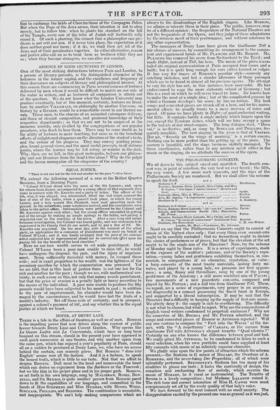HOFER, AT DRURY LANE.
THERE is a tide in the affairs of theatres, as well as of men. ROSSINI is the impelling power that now drives along the current of public favour towards Drury Lane and Covent Garden. Why operas like La Gazza Ladra and La Cenerentola, which have so long been buoyant on this stream, should in the present year have appeared in such quick succession at one theatre, and why another opera from the same pen, which has enjoyed a year's popularity at Paris, should all on a sudden be produced at Drury Lane, we, who have no access behind the curtain, can scarcely guess. But Rossim "done into English" seems now all the fashion. And it is a fashion, to speak the honest truth, which is little to our taste. Not that we affect to despise ROSSINI. Dull must be the head and immoveable the heart which can derive no enjoyment from the Barbiere or the Tancredi ; but we like him in his proper place and in his proper garb. ROSSINI, as set forth in his own language, sung by MALIBRAN, RONZI, DON- ZELLI, and DE BEGNIS, is quite another person from Rossim pared down to fit the capabilities of our language, and committed to the hands of Miss STEPHENS and Miss HUGHES, with Messrs. Woon, SINCLAIR, PHILLIPS, and BEDFORD. The combination is unsuitable, and inappropriate. We can't help making comparisons which are always to the disadvantage of the English singers. Like Rossim, we admire or tolerate them in their place. The public, however, may be of a different opinion : the frequenters of the National Theatres are not the frequenters of the Opera, and they judge of these adaptations by the intrinsic merit of their performance, and without reference to any other representation. The managers of Drury Lane have given the Guillaume Tell a fair chance of success, by committing its arrangement to the compe- tent and experienced hands of Mr. PLANCHE and Mr. BISHOP. Mr. PLANC HE has removed his scene from Switzerland to the Tyrol ; and made !Wen instead of Tell, his hero. The music of the piece is cur- tailed (its original representation at Paris occupied four hours and a half); but it is quite long enough for ears either learned or vulgar. It has very few traces of ROSSINI'S peculiar style—scarcely any catching melodies, and but a slender allowance of those passages which are to be found in almost all his previous operas. The attempt to vary his style has not, in this instance, been successful. He has endeavoured to copy the more elaborate school of Germany ; but this is a road on which he will never travel to fame. He knows how to make the most of a single idea ; but of the complicated process by which a German developes his score, he has no notion. His best songs and concerted pieces are struck off at a heat, and for his instru- mental effects he usually trusts to a mere increase of noise and speed. Of noise we have plenty in Hofer ; of good orchestral writing, but little. It contains hardly a single melody which lingers upon the ear, except the Tyrolean dance, which will ere long occupy a space in the barrels of our street-organs. The long dialogue duet, "Dove vai," is ineffective, and, as sung by SINCLAIR and PHILLIPS, fre- quently inaudible. The best singing in the piece is that of VESTRIS. Her air, "Sweetly on the wings of morning," is a certain encore. Nothing can be more perfect than the getting up of the piece. The scenery is beautiful, and the stage business skilfully managed. To these excellencies, rather than to any intrinsic merit either in the music or the singing, do we attribute the success of the opera.


















 Previous page
Previous page